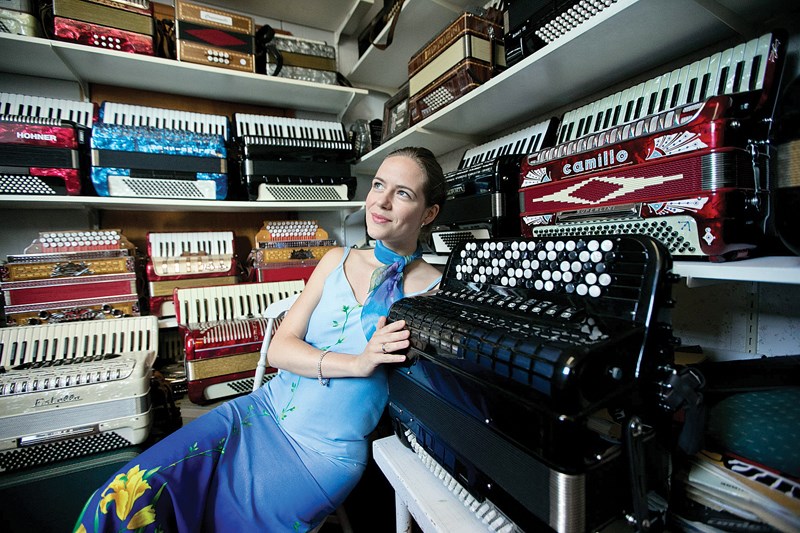Friday Night Concert – Jelena Milojevic, West Vancouver Memorial Library, Friday, Nov. 18, 7:30 p.m. Free admission.
This is a story about accordion music – no, don’t stop reading yet.
In the former Yugoslavia, far from the oom-pah-pah of polka, a little girl chose her instrument: the harp.
No, she was told, we don’t have a harp.
In that case, nine-year old Jelena Milojevic decided she would play piano.
“They told me, ‘Oh, you’re too old to play piano,’” she recalls.
Undaunted at being over-the-hill, she considered the violin. Why not? After all, her friends played the violin – dragging the bow across the strings and producing a squeak like an American bobtail with an impacted molar.
No, not the violin, she decided.
“I didn’t have another option,” she says with a laugh. “That’s how accordion chose me.”
It can feel a little like fate when musicians find their instrument. Jimi Hendrix’s father is said to have acquired his son’s first guitar during a poker game. There are tales of bandleader Benny Goodman being assigned the clarinet because he couldn’t carry a tuba.
Seeing Milojevic wield her accordion, moving and swaying with it like a dance partner, that same streak of fate seems to be at work.
Her performances are all the more remarkable when you consider how starkly the odds were stacked against her at the start.
She didn’t have perfect pitch – and more crucially, she didn’t have an accordion.
“I was still the best student in that school because I was sight-reading like crazy,” she reports.
On the website MusicForAccordion.com, which unironically bills itself as “the largest accordion resource on the web,” the instrument’s invention is traced to China’s legendary Yellow Emperor Huangdi.
China’s mythical ruler tasked one of his scholars with the task of reproducing the song of the phoenix bird. The scholar returned with a sheng, the first known instrument to use the vibrating reed principle.
Nearly 5,000 years passed before the accordion was finally realized in 1822.
Like the world, Milojevic had to wait for her instrument.
As she waited, Yugoslavia was descending into warfare.
Her grandparents’ house wasn’t worth much at the time (“peanuts,” is how Milojevic puts it) but the home was still worth something, and her grandparents decided to sell it to buy their granddaughter an accordion.
“They were my angels from the start to the end,” Milojevic says of her grandparents. “I’m grateful to them till death.”
As civilians clashed with the military and borders were drawn, music offered solace and escape.
“There were lots of families that lost somebody in the war, there were lots of families that split throughout the war, there were lots of mixed marriages – my parents were one of them,” she explains. “In the hard surroundings during the war and after the war when there’s poverty all around – you really have to show that you are one of the best … to actually break through and create some kind of a name and have some future.”
There were times when she felt like the chaos didn’t touch her, but there were other times when Yugoslavia’s dissolution and Milojevic’s own drive to succeed intertwined.
“I had some nights when I would cry with music, cry my eyes out,” she says. “All of that helped me to become a more mature person and very deep inside emotionally so that I could express some pieces that are extremely hard to be understood and expressed.”
As much as she may owe a musical debt to her homeland, there came a point when Milojevic knew it wasn’t the right place for her anymore.
“I was a girl from Croatia that married a Serbian guy,” she says simply.
After having their first child, the couple opened a map of the world and tried to imagine a new life in a new place.
A disagreement on temperature led them to rule out Australia, and if they were to move to Europe they worried they would always feel like foreigners.
“So we were thinking, ‘OK, maybe a country where everyone is a foreigner.’”
They now live in Victoria, where Milojevic is an instructor at the Victoria Conservatory of Music.
The place feels like home, she reports.
She still has family in Croatia, including those grandparents who bought her that first, all-important accordion.
She still keeps in touch, she says.
“They’re listening to my CDs all the time,” she says.



